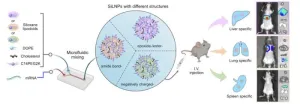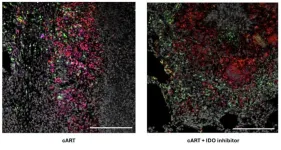(Press-News.org) As many as 249 lives could have been saved in London during the 2018 record-setting hot summer had the city widely adopted cool roofs, estimates a new study by researchers at UCL and the University of Exeter.
The paper, published in Nature Cities, analysed the cooling effect that roofs painted white or other reflective colours would have on London’s ambient temperature between June and August 2018, the city’s hottest summer. From June through August, the average temperature around London was 19.2 degrees C, about 1.6 degrees warmer than average for that time of year.
Urban environments tend to absorb a lot of heat and are usually a few degrees warmer than the surrounding region, an effect known as the ‘urban heat island’. Painting roofs white or reflective colours would absorb less radiant energy from the Sun than traditional dark roofs, effectively cooling the city.
The researchers found that had cool, light-coloured roofs been widely installed throughout London, it could have cooled the city by about 0.8 degrees C on average, preventing the heat-related deaths of an estimated 249 people – equating to around 32% of the 786 heat-related deaths during that period.
In the same paper, the researchers also found that had rooftop photovoltaic solar panels been similarly widely adopted, they would also have cooled the city by about 0.3 degrees C. This would have prevented the deaths of an estimated 96 people across the city, or 12% of the heat-related deaths during that summer.
The researchers used a complex 3D computer model to simulate the outcomes of different urban environments. They calculated what the average urban temperatures were during the hot 2018 summer (cross-checking it against actual measurements from the time) and then compared the temperature differences if all roofs in London were given a reflective coating, if all roofs were covered in rooftop solar panels and what the temperature of a hypothetical non-urbanised London would be.
The team also estimated the economic impact of the increased mortality rates of the two scenarios. The 96 lives saved by the adoption of rooftop solar panels would have reduced the economic burden on the city by about £237 million, while the 249 lives saved by adopting cool roofs would have reduced the city’s economic burden by about £615 million.
In addition, had rooftop solar panels been widely installed, the researchers estimate that the total electricity that could have been produced during that three-month timeframe would have been as much as 20 terawatt-hour (TWh), more than half the energy usage of London during the entire year of 2018.
Lead author, Dr Charles Simpson (UCL Bartlett School Environment, Energy & Resources) said: “If widely adopted, cool roofs can significantly reduce the ground-level air temperature of a city. The resulting cooling effect across the city would save lives and improve the quality of life for residents throughout the urban area. Solar panels have great benefits as a source of renewable power, so it’s good to see they won’t make the city hotter.”
Combating urban heat is growing in importance as the world continues to warm because of climate change. Though unusual at the time, hot summers like the one in 2018 are projected to occur more frequently because of the warming climate. In addition, the UK is particularly vulnerable to the effect as an estimated 83% of the country's population lives in urban areas.
Dr Simpson added: “As the effects of climate change manifest more and more, people living in cities will need to find new ways to adapt. Our research shows that cool roofs could be an effective way to mitigate the heat-trapping effects of urban environments.”
Co-author Professor Tim Taylor of the University of Exeter said: “The need for our cities to adapt to climate change is clear. Changing our roof spaces offers one potential solution. We need to encourage action like this, to reduce the burden of excess heat on people living in urban areas and capture potential co-benefits, including energy generation.”
Recent preliminary research by members of the team found that during the three hottest days of 2018, wide adoption of cool roofs would have lowered the city’s average temperature by about 1.2 degrees C, while rooftop solar panels would have lowered the average temperature by about 0.3 degrees C. This new research extends those modelling efforts throughout the whole summer of 2018, the hottest on record for London.
The research developed as part of the HEROIC: Health and Economic impacts of Reducing Overheating in Cities project based at UCL and Exeter, and supported by Wellcome Trust and NERC.
Notes to Editors
For more information or to speak to the researchers involved, please contact Michael Lucibella, UCL Media Relations. T: +44 (0)75 3941 0389, E: m.lucibella@ucl.ac.uk
Modelled temperature, mortality impact, and external benefits of cool roofs and rooftop photovoltaics in London, ‘Modelled temperature, mortality impact, and external benefits of cool roofs and rooftop photovoltaics in London’ will be published in Nature Cities on Tuesday 1 October 2024, 10:00 UK time 05:00 US Eastern Time, and is under a strict embargo until this time.
The DOI for this paper will be 10.1038/s44284-024-00138-1.
Following publication, the paper will be available at https://www.nature.com/articles/s44284-024-00138-1
Additional material
Dr Charles Simpson’s academic profile
Dr Tim Taylor’s academic profile
UCL Bartlett School of Environment, Energy and Resources
UCL Faculty of the Built Environment
University of Exeter
About UCL – London’s Global University
UCL is a diverse global community of world-class academics, students, industry links, external partners, and alumni. Our powerful collective of individuals and institutions work together to explore new possibilities.
Since 1826, we have championed independent thought by attracting and nurturing the world's best minds. Our community of more than 50,000 students from 150 countries and over 16,000 staff pursues academic excellence, breaks boundaries and makes a positive impact on real world problems.
The Times and Sunday Times University of the Year 2024, we are consistently ranked among the top 10 universities in the world and are one of only a handful of institutions rated as having the strongest academic reputation and the broadest research impact.
We have a progressive and integrated approach to our teaching and research – championing innovation, creativity and cross-disciplinary working. We teach our students how to think, not what to think, and see them as partners, collaborators and contributors.
For almost 200 years, we are proud to have opened higher education to students from a wide range of backgrounds and to change the way we create and share knowledge.
We were the first in England to welcome women to university education and that courageous attitude and disruptive spirit is still alive today. We are UCL.
www.ucl.ac.uk | Follow @uclnews on X (formerly Twitter) | Read news at www.ucl.ac.uk/news/ | Listen to UCL podcasts on SoundCloud | View images on Flickr | Find out what’s on at UCL Mind
END
Cool roofs could have saved lives during London’s hottest summer
As many as 249 lives could have been saved in London during the 2018 record-setting hot summer had the city widely adopted cool roofs, estimates a new study by researchers at UCL and the University of Exeter.
2024-10-01
ELSE PRESS RELEASES FROM THIS DATE:
Solidarity drives online virality in a nation under attack, study of Ukrainian social media reveals
2024-10-01
While divisive social media posts get more traction in countries such as the US, a new study shows that celebrating national unity is the way to go viral in Ukraine.
“Ingroup solidarity” statements got far more likes and shares than hostile posts about Russians – a trend that only grew stronger in the wake of the invasion.
The first major study of social media behaviour during wartime has found that posts celebrating national and cultural unity in a country under attack receive significantly more online engagement than derogatory posts about the aggressors.
University of Cambridge psychologists analysed a total of 1.6 million ...
Research heralds new era for genetics
2024-10-01
UNDER STRICT EMBARGO UNTIL 10AM (UK TIME) ON TUESDAY 1 OCTOBER 2024.
Peer reviewed | Observational study | People
Research led by scientists at Queen Mary University of London is heralding in a new era for genetic sequencing and testing.
In the largest study of its kind to date, published today in Nature Medicine, an international group of researchers led by Queen Mary used new bioinformatics techniques to scan the genetic profiles of 80,000 people to understand the frequency of specific expansions of short repetitive DNA sequences in the general population.
These expansions are the most common cause of inherited neurological ...
Deep brain stimulation instantly improves arm and hand function post-brain injury
2024-10-01
Deep brain stimulation may provide immediate improvement in arm and hand strength and function weakened by traumatic brain injury or stroke, University of Pittsburgh School of Medicine researchers report today in Nature Communications.
Encouraging results from extensive tests in monkeys and humans open a path for a new clinical application of an already widely used brain stimulation technology and offer insights into neural mechanisms underlying movement deficits caused by brain injury.
“Arm and hand paralysis significantly impacts the quality ...
Siloxane nanoparticles unlock precise organ targeting for mRNA therapy
2024-10-01
Penn Engineers have discovered a novel means of directing lipid nanoparticles (LNPs), the revolutionary molecules that delivered the COVID-19 vaccines, to target specific tissues, presaging a new era in personalized medicine and gene therapy.
While past research — including at Penn Engineering — has screened “libraries” of LNPs to find specific variants that target organs like the lungs, this approach is akin to trial and error. “We’ve never understood how the structure of one key component of the LNP, ...
Building better solar cells: assembly of 2D molecular structures with triptycene scaffold
2024-10-01
Research in the field of material science and electronics relies on the innovative arrangement of molecules or atoms to develop materials with unique properties not found in conventional materials. Two-dimensional (2D) assemblies of π-electronic systems, arranged in thin layers, are becoming increasingly important in the fields of materials science and organic electronics. Their unique arrangement allows for specific electronic and physical properties, making them ideal for applications like solar cells, and flexible displays. However, creating such assemblies is challenging because it often requires special designs and techniques for each ...
Maybe we shouldn’t even call low-grade prostate cancer “cancer”
2024-10-01
A new paper in the Journal of the National Cancer Institute, published by Oxford University Press, indicates that patients may benefit if doctors stop calling certain early-stage changes to the prostate “cancer” at all.
Prostate cancer is the second leading cause of cancer death worldwide in men, but far more patients are diagnosed than die of the disease. In 2022, there were nearly 1.5 million cases of prostate cancer, but only 400,000 deaths. Low-grade prostate cancer, commonly known as GG1 among physicians, virtually never metastasizes or causes symptoms. Some medical researchers have wondered recently if it would be a benefit ...
‘Cheeky’ discovery allows scientists to estimate your risk of dying using cells found in the mouth
2024-10-01
We don’t all age at the same rate. But while some supercentenarians may age exceptionally slowly due to winning the genetics jackpot, a plethora of behavioral and lifestyle factors are known to speed up aging, including stress, poor sleep, poor nutrition, smoking, and alcohol. Since such environmental effects get imprinted on our genome in the form of epigenetic marks, it is possible to quantify molecular aging by characterizing the epigenome at prognostic genomic sites.
Over the past decade, scientists have developed several such ‘epigenetic clocks’, calibrated against chronological age and various lifestyle factors across large ...
ChatGPT shows human-level assessment of brain tumor MRI reports
2024-10-01
As artificial intelligence advances, its uses and capabilities in real-world applications continue to reach new heights that may even surpass human expertise. In the field of radiology, where a correct diagnosis is crucial to ensure proper patient care, large language models, such as ChatGPT, could improve accuracy or at least offer a good second opinion.
To test its potential, graduate student Yasuhito Mitsuyama and Associate Professor Daiju Ueda’s team at Osaka Metropolitan University’s Graduate ...
Promising TB therapy safe for patients with HIV
2024-10-01
SAN ANTONIO (October 1, 2024) – A therapy showing promise to help control tuberculosis (TB) does not interfere with combined antiretroviral therapy (cART), according to research by Texas Biomedical Research Institute (Texas Biomed).
“This is an important hurdle that this host-directed therapy had to clear in order to help patients battling both HIV and TB,” said Texas Biomed Professor Smriti Mehra, Ph.D., who led the study recently published in the peer-reviewed journal JCI Insight.
TB is responsible for more than 1.3 million deaths worldwide every year. Dr. Mehra ...
American Academy of Pediatrics examines the impact of school expulsion and recommends ways to create supportive learning environments for all students
2024-10-01
Media Contacts:
Alex Hulvalchick, 630-626-6282
Lisa Robinson, 630-626-6084, lrobinson@aap.org
American Academy of Pediatrics Examines the Impact of School Expulsion and Recommends Ways to Create Supportive Learning Environments for All Students
Updated policy statement on school suspension to be released during the AAP 2024 National Conference & Exhibition in Orlando.
ORLANDO, Fla.--Suspending or expelling a student is one of the most severe punishments a school can impose on a student – and it can have lifelong, devastating consequences. ...
LAST 30 PRESS RELEASES:
Fossil amber reveals the secret lives of Cretaceous ants
Predicting extreme rainfall through novel spatial modeling
The Lancet: First-ever in-utero stem cell therapy for fetal spina bifida repair is safe, study finds
Nanoplastics can interact with Salmonella to affect food safety, study shows
Eric Moore, M.D., elected to Mayo Clinic Board of Trustees
NYU named “research powerhouse” in new analysis
New polymer materials may offer breakthrough solution for hard-to-remove PFAS in water
Biochar can either curb or boost greenhouse gas emissions depending on soil conditions, new study finds
Nanobiochar emerges as a next generation solution for cleaner water, healthier soils, and resilient ecosystems
Study finds more parents saying ‘No’ to vitamin K, putting babies’ brains at risk
Scientists develop new gut health measure that tracks disease
Rice gene discovery could cut fertiliser use while protecting yields
Jumping ‘DNA parasites’ linked to early stages of tumour formation
Ultra-sensitive CAR T cells provide potential strategy to treat solid tumors
Early Neanderthal-Human interbreeding was strongly sex biased
North American bird declines are widespread and accelerating in agricultural hotspots
Researchers recommend strategies for improved genetic privacy legislation
How birds achieve sweet success
More sensitive cell therapy may be a HIT against solid cancers
Scientists map how aging reshapes cells across the entire mammalian body
Hotspots of accelerated bird decline linked to agricultural activity
How ancient attraction shaped the human genome
NJIT faculty named Senior Members of the National Academy of Inventors
App aids substance use recovery in vulnerable populations
College students nationwide received lifesaving education on sudden cardiac death
Oak Ridge National Laboratory launches the Next-Generation Data Centers Institute
Improved short-term sea level change predictions with better AI training
UAlbany researchers develop new laser technique to test mRNA-based therapeutics
New water-treatment system removes nitrogen, phosphorus from farm tile drainage
Major Canadian study finds strong link between cannabis, anxiety and depression
[Press-News.org] Cool roofs could have saved lives during London’s hottest summerAs many as 249 lives could have been saved in London during the 2018 record-setting hot summer had the city widely adopted cool roofs, estimates a new study by researchers at UCL and the University of Exeter.




